Filter by...
-

What does your browsing history say about you?
An average internet user visits dozens of websites and hundreds of web pages every day, most of which are kept in the history of our internet browsers. But what if someone took this massive database of visited web pages and cross-referenced them? A joint collaboration of Tactical Tech and SHARE Lab researchers focused on discovering […]
Read more
-

ENDitorial: Fake news about fake news being news
We have heard a lot about fake news over recent months. We have heard urgent calls for action from politicians to deal with this new problem – governments should regulate truth, Facebook should regulate truth, new ministries of truth should regulate the truth. The political world is clear – somebody should do something, quickly! In […]
Read more
-

Google’s forgetful approach to the “right to be forgotten”
Google is unquestionably a pioneer with regard to transparency reporting in the online environment. It was among the first to demand more transparency regarding government restrictions on freedom of communication and access to user data. The company has continued to learn and refine its processes. It has produced a consistent methodology for the various types […]
Read more
-
Commission responds to Ombudsman investigation on EU Internet Forum
In April 2016, the European Ombudsman launched an investigation into the European Commission’s failure to disclose information of the “EU Internet Forum”. The EU Internet Forum brings together US internet companies (Microsoft, Facebook, Twitter, Google), government officials, and law enforcement agencies to discuss how to reduce the accessibility of undefined “terrorist material” and badly defined […]
Read more
-
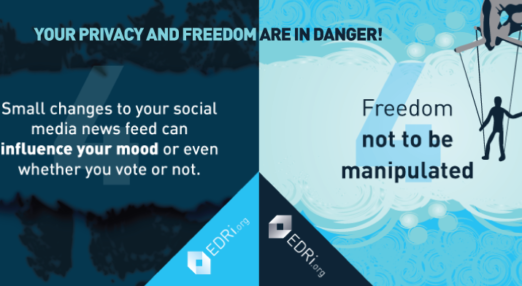
#4 Freedom not to be manipulated: How to fight weapons of math destruction*
This is the fourth blogpost of our series dedicated to privacy, security and freedoms. In the next weeks, we will explain how your freedoms are under threat, and what you can do to fight back.
Read more
-
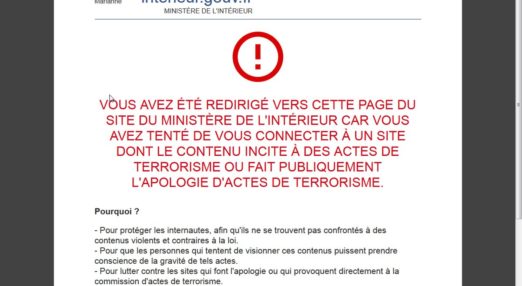
Orange is the new blacklist
On Monday morning 17 October, Orange customers who tried to access Google.fr, fr.wikipedia.org and other sites found themselves being redirected to the site of the Interior Ministry explaining that those sites were blocked. The banned websites were accused of “provoking terrorist acts or publicly glorifying terrorist acts”.
Read more
-

Social media as censors of public sphere: YouTube vs. Ombudsman
In early September 2016, a popular Norwegian writer got suspended from Facebook, on account of “child nudity”. The matter escalated into an international incident, involving Norway’s largest printed newspaper and the country’s prime minister. Finally the writer’s Facebook status was restored, the suspension was ended, and Facebook promised to do better.
Read more
-
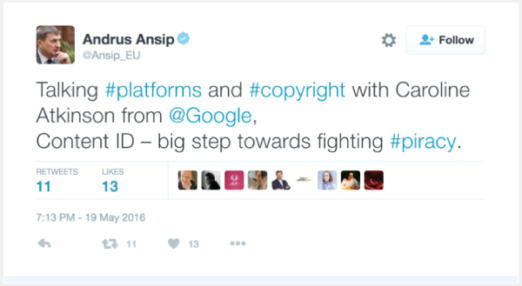
EU is now giving Google new monopolies
Originally published on The European Sting There is a lot of noise in the press and among lobbyists about an alleged hostility of the EU towards big American internet companies. Reality is more nuanced and more surprising – the policies appear to be hell-bent on giving Google new monopolies, to the detriment of European citizens […]
Read more
-

Three steps to end freedom of expression
Our right to freedom of expression is laid out in law by the EU Treaties. To ensure democracy and accountability, this fundamental human right may not be restricted unless it is necessary, achieves an objective of general interest and the measure to restrict it is provided for by law.
Read more
-
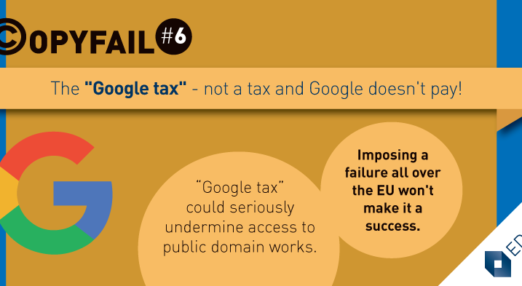
Copyfail #6: The “Google tax”- not a tax and Google doesn’t pay
This article is the sixth in the series presenting Copyfails. The EU is reforming its copyright rules. We want to introduce you to the main failures of the current copyright system, with suggestions on how to fix them. You can find all the Copyfails here. How has it failed? Germany and Spain introduced in their […]
Read more
-
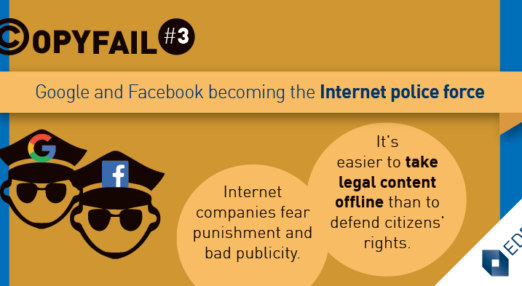
Copyfail #3: Google and Facebook becoming the Internet police force
This article is the third in the series presenting Copyfails. The EU is reforming its copyright rules. We want to introduce to you the main failures of the current copyright system, with suggestions on how to fix them. You can find all the Copyfails here.
Read more
-

Guide to the Code of Conduct on Hate Speech
On 31 May, the European Commission, together with Facebook, YouTube (Google), Twitter and Microsoft, agreed a “code of conduct” (pdf) on fighting hate speech. We believe that the code of conduct will damage enforcement of laws on hate speech, and undermine citizens’ fundamental rights. In a joint press release, EDRi and Access Now have therefore […]
Read more
